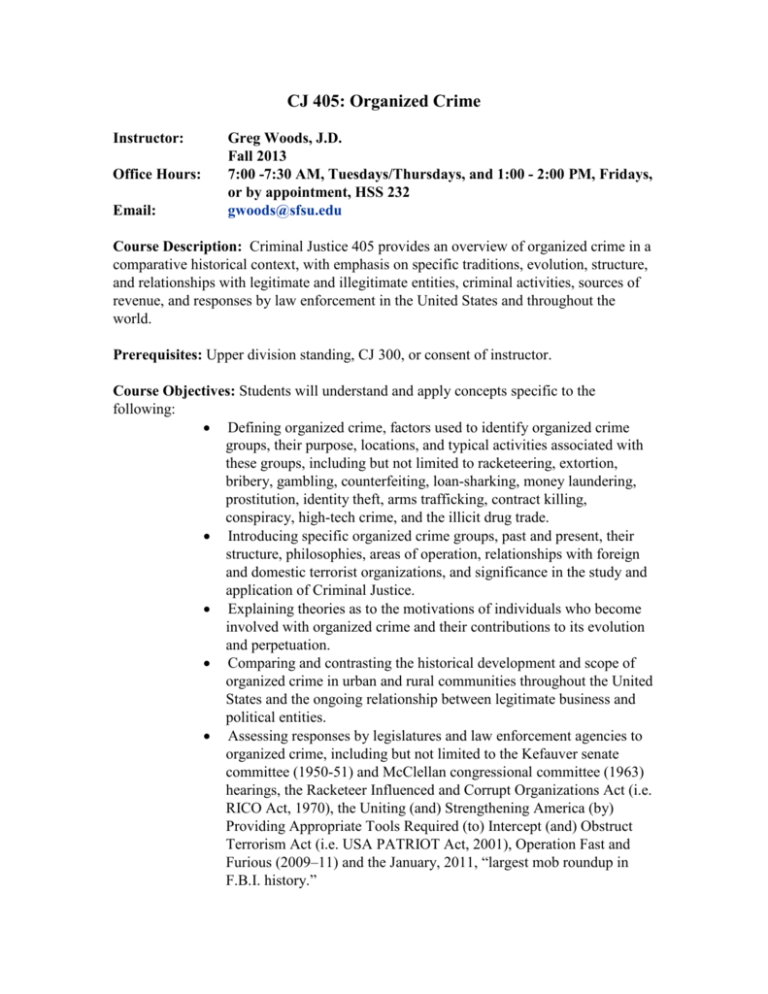
CJ 405: Organized Crime
Instructor:
Office Hours:
Email:
Greg Woods, J.D.
Fall 2013
7:00 -7:30 AM, Tuesdays/Thursdays, and 1:00 - 2:00 PM, Fridays,
or by appointment, HSS 232
gwoods@sfsu.edu
Course Description: Criminal Justice 405 provides an overview of organized crime in a
comparative historical context, with emphasis on specific traditions, evolution, structure,
and relationships with legitimate and illegitimate entities, criminal activities, sources of
revenue, and responses by law enforcement in the United States and throughout the
world.
Prerequisites: Upper division standing, CJ 300, or consent of instructor.
Course Objectives: Students will understand and apply concepts specific to the
following:
• Defining organized crime, factors used to identify organized crime
groups, their purpose, locations, and typical activities associated with
these groups, including but not limited to racketeering, extortion,
bribery, gambling, counterfeiting, loan-sharking, money laundering,
prostitution, identity theft, arms trafficking, contract killing,
conspiracy, high-tech crime, and the illicit drug trade.
• Introducing specific organized crime groups, past and present, their
structure, philosophies, areas of operation, relationships with foreign
and domestic terrorist organizations, and significance in the study and
application of Criminal Justice.
• Explaining theories as to the motivations of individuals who become
involved with organized crime and their contributions to its evolution
and perpetuation.
• Comparing and contrasting the historical development and scope of
organized crime in urban and rural communities throughout the United
States and the ongoing relationship between legitimate business and
political entities.
• Assessing responses by legislatures and law enforcement agencies to
organized crime, including but not limited to the Kefauver senate
committee (1950-51) and McClellan congressional committee (1963)
hearings, the Racketeer Influenced and Corrupt Organizations Act (i.e.
RICO Act, 1970), the Uniting (and) Strengthening America (by)
Providing Appropriate Tools Required (to) Intercept (and) Obstruct
Terrorism Act (i.e. USA PATRIOT Act, 2001), Operation Fast and
Furious (2009–11) and the January, 2011, “largest mob roundup in
F.B.I. history.”
Required Text: Lyman, M.D. and Potter, G. W. (2007). Organized Crime (5th Edition).
Upper Saddle River, NY: Pearson-Prentice Hall. ISBN 0-132-45777-6
Attendance Policy: Attendance is required and will be taken at the beginning of each
class session. Please note: Students who are routinely absent, late, inattentive, or
who choose not to contribute to in-class discussion and activities, will be noted and
result with up to 10% (one letter grade) deducted from the final grade.
Grading:
Final Examination
Weekly Quizzes
Weekly Assignments
50%
25%
25%
Grading Scale:
A = 90-100
B = 80-89
C = 70-79
D = 60-69
F= 59 and below.
Quizzes & Assignments: Quizzes will be administered and Written Assignments collected
every Thursday as reflected below. Students will be assigned weekly reading and writing
assignments and are required to review and define Terms and be prepared to discuss Points
of Discussion questions from the textbook. Written Assignments will consist of a one to two
paged single spaced typed analysis, 12-point font, based upon the week’s reading
assignment. Detailed instructions will be provided for all written assignments during
Tuesday class sessions. Makeup quizzes will not be given, late assignments will not be
accepted, and no assignment may be submitted via email. Failure to take a quiz at the
scheduled time and date will result in a grade of zero for that quiz.
Dates, Topics of Discussion, Quizzes and Assignments:
Week 1
August 27 & 29
Introductions/Course overview; Weekly Quiz and Assignment Formats;
No Reading, Assignment, nor Quiz
Week 2
September 3 & 5
Read Chapter 1: Understanding Organized Crime; In-class exercise (pg 25 Critical
Thinking Project); Review Terms (pg 58); Be prepared to discuss Points of Discussion
questions 1-7 (pg 58); Submit Written Assignment; Quiz #1.
Week 3
September 10 & 12
Read Chapter 2: Theories of Organized Criminal Behavior; Review Terms (pg 78); Be
prepared to discuss Points of Discussion questions 1-7 (pg 78); Submit Written
Assignment; Quiz #2.
Week 4
September 17 & 19
Read Chapter 3: The Evolution of Organized Crime: Urban Beginnings; Review Terms
(pg 116); Be prepared to discuss Points of Discussion questions 1-6 (pg 116); Submit
Written Assignment; Quiz #3.
Week 5
September 24 & 26
Read Chapter 4: The Evolution of Organized Crime: Southern Beginnings; Review
Terms (pg 133); Be prepared to discuss Points of Discussion question 1 (pg 133); Submit
Written Assignment; Quiz #4.
Week 6
October 1 & 3
Read Chapter 5: The Businesses of Organized Crime; Review Terms (pg 175); Be
prepared to discuss Points of Discussion questions 1-6 (pg 176); Submit Written
Assignment; Quiz #5.
Week 7
October 8 & 10
Read Chapter 6: The Illicit Drug Trade; Review Terms (pg 200); Be prepared to discuss
Points of Discussion questions 1-7 (pg 200); Submit Written Assignment; Quiz #6.
Week 8
October 15 & 17
Read Chapter 7: Domestic Organized Crime Groups; Review Terms (pg 239); Be
prepared to discuss Points of Discussion questions 1-5 (pg 239); Submit Written
Assignment; Quiz #7.
Week 9
October 22 & 24
Read Chapter 8: Comparative Perspective/International Cartels, etc.; Review Terms (pg
296); Be prepared to discuss Points of Discussion questions 1-5 (pg 296); Submit Written
Assignment; Quiz #8.
Week 10
October 29 & 31
Read Chapter 9: Terrorism as Organized Crime; Review Terms (pg 344); Be prepared to
discuss Points of Discussion questions 1-5 (pg 344); Submit Written Assignment; Quiz
#9.
Week 11
November 5 & 7
Read Chapter 10: Organized Crime’s Political & Corporate Alliances; Review Terms (pg
379); Be prepared to discuss Points of Discussion questions 1-6 (pg 379); Submit Written
Assignment; Quiz #10.
Week 12
November 12 & 14
Read Chapter 11: Controlling Organized Crime; In-class activity (pg 402 What is the
Best Approach for Attacking Organized Crime?); Review Terms (pg 407); Be prepared to
discuss Points of Discussion questions 1-6 (pg 407); Submit Written Assignment; Quiz
#11.
Week 13
November 19 & 21
Chapter 11
Domestic Terrorism Incidents & Groups; Review Appendix B (pg 412) and Appendix C
(pg 416); Submit Written Assignment; Quiz #12.
Week 14
November 26 & 28
Thanksgiving Holiday!
Week 15
December 3 & 5
Convergence between international terrorism and transnational organized crime;
Counterterrorism; Review Appendix D (pg 419); Submit Written Assignment; Quiz #13.
Week 16
December 10 & 12
Responses to Organized Crime: RICO & USA PATRIOT Act of 2001; Review Appendix
A (pg 408); Submit Written Assignment; Quiz #14.
Week 17
December 17 & 19
Review for Final Examination; Final thoughts (Tuesday)
Final Examination (Thursday)






